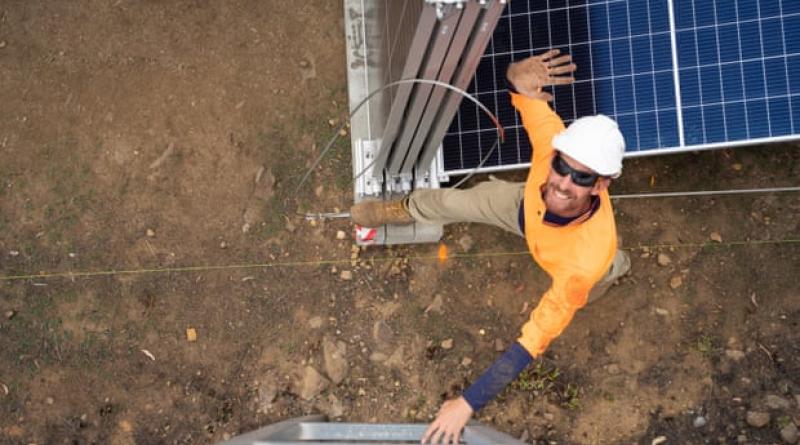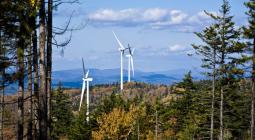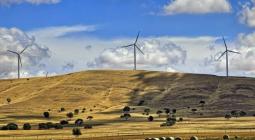Business, unions and green groups call for sustainable Covid-19 recovery with clean energy transition.

Exclusive: Letter to national cabinet, energy ministers and Nev Power warns Australia’s prosperity depends on cutting emissions
A cross-society collection of groups – representing business, the energy industry, property owners, unions, major investors, disadvantaged people and the environment – have banded together to warn that Australia’s prosperity depends on eradicating greenhouse gas emissions.
In a letter to the national cabinet, federal and state energy ministers and Nev Power, Scott Morrison’s handpicked Covid-19 recovery chairman, the 14 organisations have called for government support in the wake of the pandemic to urgently stimulate job growth and rebuild a “sustainable and strong economy”.
They say it should include measures to cut emissions and accelerate a transition to clean energy across all regions and economic sectors, and recommend a focus on fixing inefficient homes and buildings.
Signatories to the letter, sent on 15 May, include the heads of the Business Council, the Property Council, the Australian Energy Council, the Australian Industry Group, the ACTU, the Australian Council of Social Service, the Brotherhood of St Laurence and the Australian Conservation Foundation.
“Australia faces a public health emergency with immediate economic impacts as well as longer-lasting global economic pain. Beyond the pandemic, Australian prosperity also depends on dealing with other long-term challenges, including the transition to net zero emissions,” the letter says.
It can bee seen as part of a growing global call for governments to respond to the economic shock of the pandemic with policies that also help tackle the climate crisis.
The federal government continues to reject a 2050 target of net zero emissions and is developing a roadmap for emissions reduction that suggests a major role for gas, a fossil fuel, alongside hydrogen, renewable energy and, potentially, nuclear power. The National Covid-19 Coordination Commission is heavily backing gas to drive the economic recovery.
The groups say there are many opportunities to cut emissions, but single out energy efficiency and management. They call for government support for upgrades across private and public housing, commercial, community and government buildings and industrial facilities.
Suggested improvements include more efficient and controllable appliances and equipment, improved “thermal envelopes” – walls, roofs, floors and windows – and shading, introducing smart meters to better manage electricity use across the day and an expanded roll-out of solar panels and home batteries.
The letter cites the International Energy Agency as highlighting that energy efficiency upgrades are “job-intensive and strongly support economic stimulus goals”. “In Australia, a major drive to improve the energy efficiency of buildings and industry could deliver over 120,000 job-years of employment,” it says.
“If done well, these investments would durably lower energy bills; ease strains on a rapidly changing energy system; improve health and safety during increasingly hot summers; boost the competitiveness of local manufacturers, whose value to Australia is clearer than ever; enable deeper emissions cuts – and sustain activity across a broad range of trades and industries.”
A report released last month by ClimateWorks Australia on how to decarbonise the country found the technology for zero-emissions buildings already existed, and much of it was simple. Steps would or could involve improving insulation and draught sealing, installing LED lighting, solar hot water and better appliances and introducing passive house design standards. It would require shifting from gas-fired heating and cooking to running on clean energy.
A separate study by Beyond Zero Emissions, another not-for-profit group, has estimated there could be more than 300,000 jobs in a national “deep energy retrofit” drive to improve the efficiency of 3m buildings across the country, starting with social housing, low-income homes, schools and hospitals, to a point where they no longer face quarterly electricity or gas bills.
The letter to governments says potential templates for publicly funded efficiency drives include the Clean Energy Finance Corporation’s support for the construction of hundreds of 7-star affordable housing units in Sydney, and a 2017 energy upgrade that cut energy use at the MCG by 24%, saving enough power to run more than 1,800 homes.
It says governments should look for other climate-friendly options that can support economic recovery and energy transition, including integrating recovery plans with long-term emissions reduction strategies and plans for modernising power grids, carbon farming and bushfire recovery.
Other signatories are the heads of WWF, the Energy Users Association, the St Vincent de Paul Society, the Investor Group on Climate Change, the Carbon Market Institute and the Energy Efficiency Council.
21 May 2020
The Guardian





